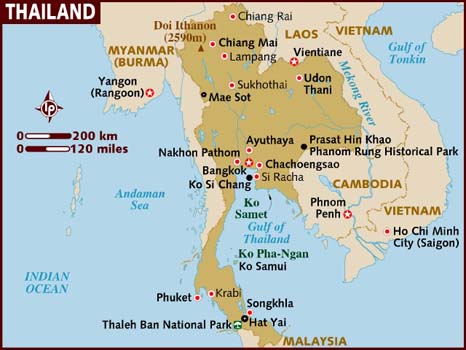Thailand’s new PM?
February 12, 2019 | Expert Insights
The royal family has been deeply connected to Thailand’s leadership for decades, often shaping it from behind the scenes. However, senior members of the palace have remained out of formal political roles, making Princess Ubolratana’s nomination a stark break with tradition.
Background
Thailand is a country at the centre of the Southeast Asian Indochinese peninsula composed of 76 provinces. It’s a constitutional monarchy that has embedded parliamentary democracy. However, the most recent coup in 2014 established a de facto military dictatorship.
The monarchy of Thailand refers to the constitutional monarchy and monarch of the Kingdom of Thailand. The King of Thailand is the head of state and head of the ruling Royal House of Chakri. Since 2000, the role of the Thai monarchy has been increasingly challenged by scholars, media, observers and traditionalists, and as more educated pro-democracy interests began to express their speech. The junta which took power in 2014 has been aggressive in jailing critics of the monarchy. In 2015, it spent US$540 million, more than the budget of the Ministry of Foreign Affairs, on a promotional campaign called "Worship, protect and uphold the monarchy." The royal family has refrained from actively participating in domestic politics in order to prevent a concentration of power.
Ubol Ratana is a member of the Thai royal family, an actress and screenwriter. She is the eldest child of King Bhumibol Adulyadej and Queen Sirikit. In 1972, she relinquished her royal titles. In 2019, in a move called "unprecedented", Ubol Ratana announced her candidacy for the Thai prime ministership, running as a candidate of the Thaksin-allied Thai Raksa Chart Party. A few hours later, King Vajiralongkorn (her younger brother) issued a statement that her candidacy for prime minister is "inappropriate...and unconstitutional".

Analysis
The entrance of Ubolratana Rajakanya, eldest child of late King Bhumibol Adulyadej, as a prime ministerial candidate in Thailand’s March 24 elections delivered a shock to the country’s political establishment. Ms. Ubolratana’s brother, King Maha Vajiralongkorn, quickly called the move “highly inappropriate”, stating that members of the royal family are “above politics”. In response, Thai Raksa Chart, a political party linked to former prime minister Thaksin Shinawatra, which nominated Ms. Ubolratana last week, withdrew the nomination on Saturday, ending her bid for the job.
The situation has created uncertainty around the election and the country’s return to civilian rule. It also nudged prime minister Prayuth Chan-ocha, head of Thailand’s governing military junta, closer to victory. “It was quite a surprise to everyone; to some, it was a shocker,” said Kraisak Choonhavan, a Democrat politician and the son of a former prime minister. “It adds a bit more colour to Thai politics and the election.”
The poll will be the first for the kingdom since a military coup led by Mr. Prayuth in 2014. The retired general said he too would contest the election as a prime ministerial candidate for the pro-junta Palang Pracharat party.
The election has been viewed as a fight between pro-junta forces and several parties affiliated with former prime minister Mr. Thaksin, who fled Thailand following a 2006 military coup but has remained popular among rural Thais. The four political parties connected to Mr. Thaksin were expected to pose a significant challenge to Mr. Prayuth, despite a new constitution that favours the junta by allowing it to appoint the 250 members of the upper house. By appointing a senior member of the royal family to one of his affiliated parties, experts believe Mr. Thaksin’s camp could defeat Mr. Prayuth in the election.
The initial announcement gave observers the impression that the monarchy was throwing its support behind Mr. Thaksin. An official bid for prime minister from Ms. Ubolratana, many assumed, would have the explicit backing of King Vajiralongkorn. Ms. Ubolratana has remained a popular figure in Thai culture while also courting controversy.
Assessment
Our assessment is that the immediate withdrawal of Ms. Ubol Ratana from the election is a sign of the royal family’s decision to not interfere with domestic politics. We believe that the royal family withdrew the candidacy to prevent any rumours of the King favouring one party over another. We also feel that this was the correct decision as it would lead to an unproportioned concentration of power in the hands of the Royal family.








Comments